What Are Common Respiratory Issues in Chinchillas?

Respiratory issues are common in chinchillas and can be caused by various factors such as poor ventilation, dusty bedding, or low humidity levels. Symptoms of respiratory issues in chinchillas include sneezing, coughing, nasal discharge, and labored breathing. If you notice any of these symptoms, it is important to consult a veterinarian experienced in treating chinchillas.
Treatment may include antibiotics, nebulization therapy, and environmental modifications to improve air quality. Preventive measures such as maintaining a clean environment, providing proper ventilation, and avoiding dusty substrates can help reduce the risk of respiratory issues in chinchillas.
Regular veterinary check-ups and prompt treatment of any respiratory symptoms are essential for ensuring the overall health and well-being of your chinchilla.
Understanding the common respiratory issues in chinchillas and knowing how to manage them is crucial for maintaining their optimal health and quality of life. By being proactive in preventing respiratory problems and seeking timely veterinary care when needed, you can help your chinchilla live a long and healthy life.
Remember to provide a clean and well-ventilated living environment, avoid exposure to irritants, and monitor your chinchilla’s respiratory health regularly to catch any potential issues early. With proper care and attention, you can keep your chinchilla happy and free from respiratory problems.
Upper Respiratory Infections
Upper respiratory infections in chinchillas commonly result from bacterial or viral pathogens affecting the nasal passages and throat. These infections can be caused by various factors, including poor ventilation, stress, or exposure to infected individuals. Chinchillas are particularly susceptible to respiratory issues due to their sensitive respiratory systems. Common risk factors include being housed in damp or dusty environments, sudden temperature changes, or coming into contact with other sick animals.
When it comes to treatment options, it’s essential to consult a veterinarian for a proper diagnosis and treatment plan. Antibiotics may be prescribed for bacterial infections, while antiviral medications may be recommended for viral cases. Additionally, supportive care such as ensuring proper hydration and nutrition is crucial for the chinchilla’s recovery.
Prevention strategies for upper respiratory infections involve maintaining a clean and well-ventilated living environment for the chinchilla, regular cage cleanings, and minimizing exposure to sick animals. Proper hygiene practices and routine health check-ups can also help in preventing these infections.
Allergic Reactions in Chinchillas
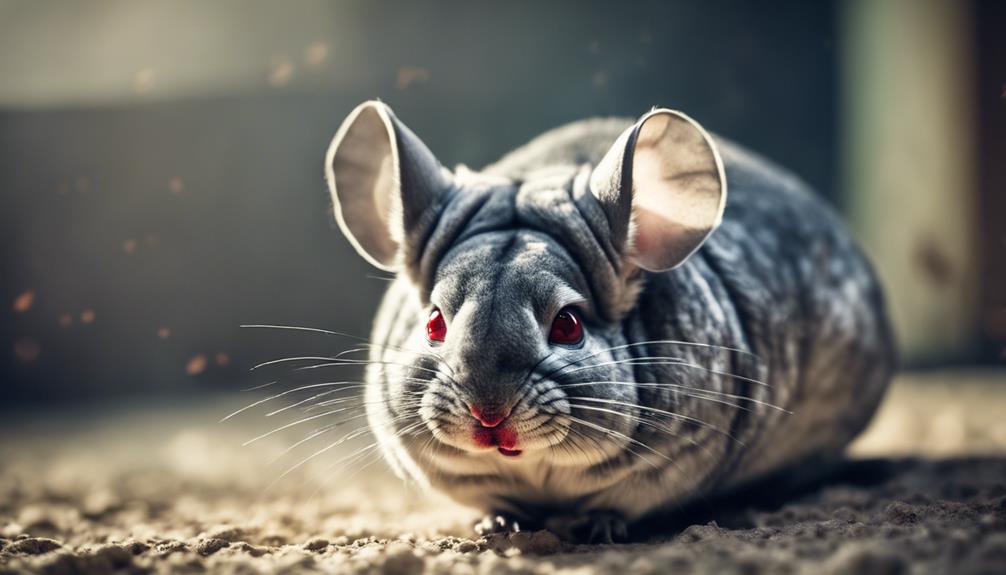
Chinchillas can also suffer from allergic reactions, which can manifest as respiratory issues. It’s crucial for chinchilla owners to be vigilant for signs such as sneezing, coughing, or difficulty breathing.
Identifying and addressing allergens promptly is essential in maintaining a chinchilla’s respiratory health.
Allergies in Chinchillas
Allergic reactions in chinchillas can manifest in various ways, impacting their respiratory health and overall well-being. Proper allergy management and chinchilla care are crucial to prevent and address these issues. Ensuring optimal respiratory health for chinchillas involves maintaining suitable housing conditions that reduce potential allergens in their environment. Here is a table summarizing key points related to allergies in chinchillas:
| Allergy Management | Chinchilla Care |
|---|---|
| Identify allergens and remove them from the chinchilla’s environment. | Provide a clean and well-ventilated living space for the chinchilla. |
| Consult a veterinarian for guidance on allergy treatment options. | Offer a balanced diet and fresh water daily. |
| Monitor the chinchilla for any signs of allergic reactions. | Handle the chinchilla gently and with care. |
Respiratory Signs to Watch
Allergy management in chinchillas involves closely observing for specific respiratory signs that may indicate allergic reactions, requiring prompt attention to safeguard the chinchilla’s health. When monitoring a chinchilla for allergic reactions, keep an eye out for the following respiratory signs:
- Labored breathing or wheezing
- Sneezing or coughing
- Nasal discharge
- Lethargy or decreased activity
If any of these symptoms are noticed, it’s crucial to seek veterinary care promptly.
Treatment options may include providing respiratory support to the chinchilla and addressing the underlying cause of the allergic reaction to ensure optimal respiratory health and overall chinchilla care.
Dust-Related Respiratory Problems
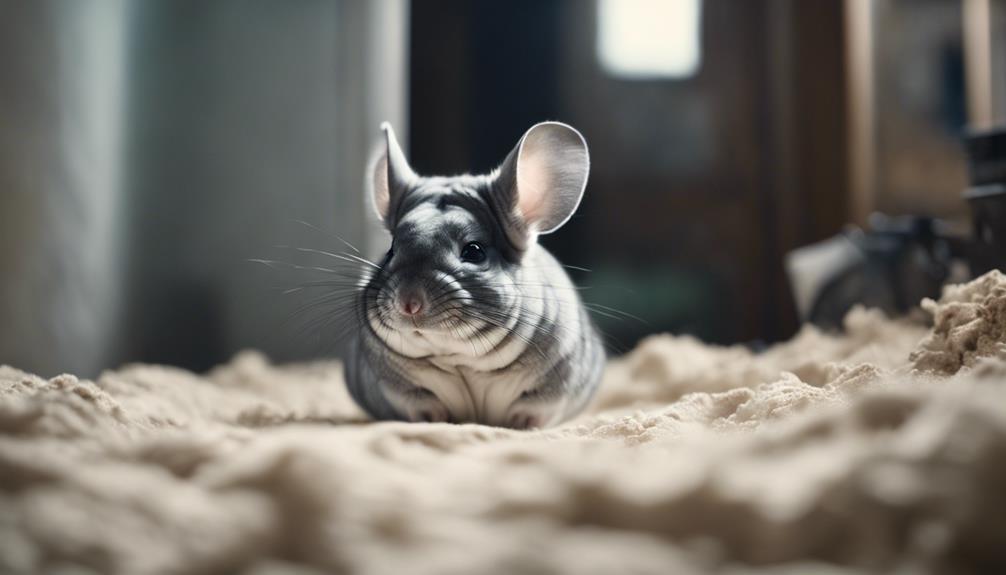
Chinchillas are sensitive to dust particles, which can lead to various respiratory issues. Symptoms such as sneezing, coughing, and difficulty breathing can indicate a dust-related problem in these small animals.
It’s crucial for chinchilla owners to minimize dust exposure in their pet’s environment to prevent and treat respiratory complications.
Dust and Chinchillas
Exposure to excessive dust can significantly impact the respiratory health of chinchillas. When considering dust and chinchillas, it’s crucial to ensure their environment is free from harmful particles. Providing proper care involves:
- Dust baths: Chinchillas require dust baths to maintain their fur health, but using appropriate dust is essential to prevent respiratory issues.
- Dust free bedding: Opt for bedding that’s dust-free to minimize the amount of particulates in the air the chinchilla breathes.
- Regular cage cleaning: Cleaning the cage frequently helps reduce dust buildup, promoting better respiratory health.
- Well-ventilated space: Ensuring good air circulation in the chinchilla’s living area can help decrease dust concentration, benefiting their respiratory system.
Respiratory Symptoms Caused
Excessive exposure to dust particles can lead to various respiratory symptoms in chinchillas, affecting their overall health and well-being. Common respiratory symptoms caused by dust-related issues include sneezing, wheezing, nasal discharge, and difficulty breathing.
Chinchillas may also exhibit signs of respiratory distress such as labored breathing or a hunched posture. These symptoms can impact their quality of life and require prompt attention to prevent further complications.
Proper chinchilla care involves minimizing dust exposure by providing a clean and well-ventilated environment, avoiding dusty bedding materials, and regularly cleaning their living space. Monitoring your chinchilla for any respiratory symptoms and seeking veterinary care if needed are essential steps in ensuring their respiratory health and overall well-being.
Prevention and Treatment
To prevent and treat dust-related respiratory problems in chinchillas, maintaining a clean and well-ventilated living environment is crucial. Here are some preventive measures and treatment options:
- Regular Cage Cleaning: Clean cages at least once a week to remove accumulated dust and debris.
- Dust-Free Bedding: Opt for dust-free bedding materials like fleece liners or aspen shavings.
- Air Purification: Use an air purifier in the chinchilla’s living area to reduce airborne particles.
- Veterinary Care: Regular check-ups with a specialized exotic animal veterinarian can help monitor respiratory health and address any issues promptly.
Pneumonia in Chinchillas
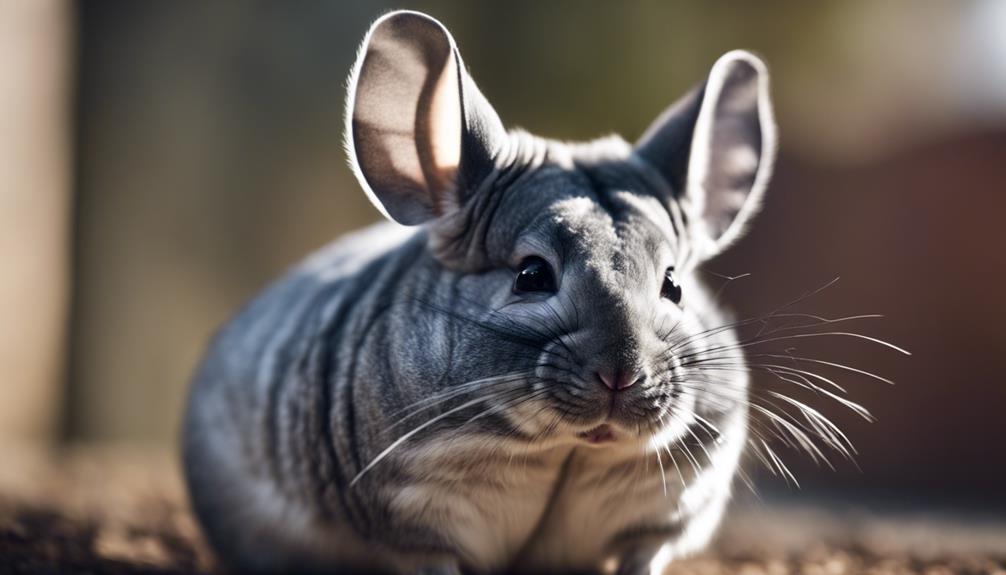
Developing pneumonia can be a serious respiratory issue for chinchillas. Pneumonia in chinchillas can be caused by various factors such as bacterial or viral infections, drafts, or stress. Symptoms of pneumonia in chinchillas include labored breathing, lethargy, decreased appetite, and nasal discharge. If left untreated, pneumonia can quickly become life-threatening for these small animals.
In cases of pneumonia, prompt veterinary care is crucial. Antibiotic treatment is often necessary to combat the infection. The veterinarian may also provide supportive care to help the chinchilla recover. It’s essential to follow the prescribed treatment plan diligently to ensure the chinchilla has the best chance of recovery.
To prevent pneumonia in chinchillas, it’s important to maintain a clean and draft-free environment for them. Regular veterinary check-ups can help catch any respiratory issues early on. Additionally, providing a balanced diet and minimizing stressors can help boost the chinchilla’s immune system, reducing the risk of developing pneumonia.
Chronic Respiratory Issues

Chinchillas with chronic respiratory issues often experience persistent breathing difficulties and may require long-term management to ensure their health and well-being. When dealing with chronic respiratory problems in chinchillas, there are several factors to consider:
- Genetic Predisposition: Some chinchillas may be genetically predisposed to respiratory issues, making them more susceptible to chronic conditions.
- Environmental Factors: Poor ventilation, high humidity levels, dusty bedding, or exposure to cigarette smoke can exacerbate respiratory problems in chinchillas.
- Treatment Options: Long-term management of chronic respiratory issues in chinchillas may involve the use of antibiotics, bronchodilators, or anti-inflammatory medications prescribed by a veterinarian.
- Long-Term Management: Regular veterinary check-ups, maintaining a clean and well-ventilated environment, and providing a balanced diet are essential for managing chronic respiratory conditions in chinchillas.
Respiratory Parasites in Chinchillas
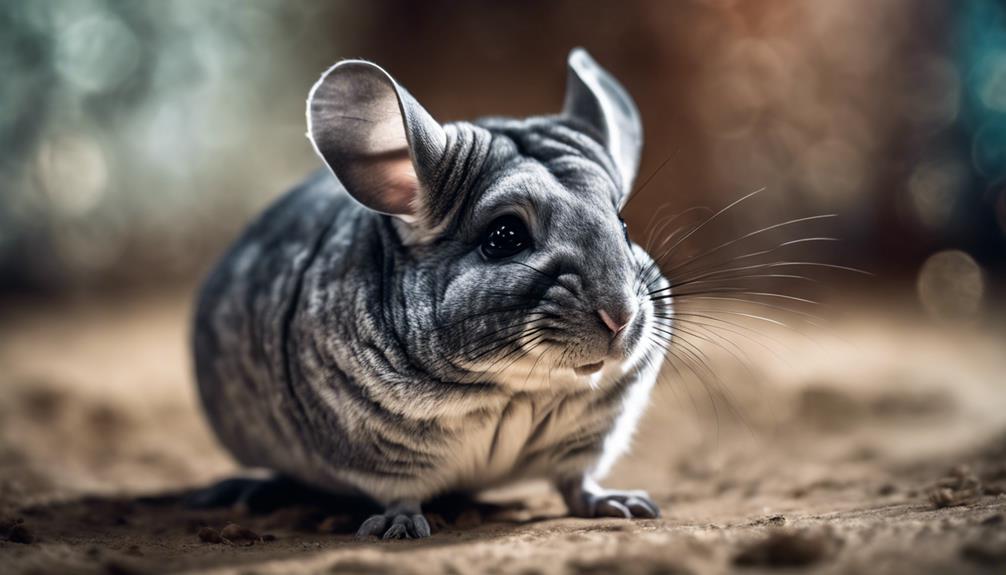
Respiratory parasites commonly affect chinchillas, posing a significant threat to their respiratory health and overall well-being. Parasitic infections in chinchillas can be caused by various organisms such as mites, fleas, and ticks, which can lead to symptoms like coughing, sneezing, nasal discharge, and difficulty breathing. If left untreated, these parasites can severely impact the chinchilla’s respiratory system, leading to more serious health issues.
To effectively treat respiratory parasites in chinchillas, it’s crucial to consult a veterinarian specialized in exotic pets. The veterinarian may recommend medications such as antiparasitic drugs to eliminate the parasites and alleviate the chinchilla’s symptoms. Additionally, maintaining good hygiene in the chinchilla’s living environment is essential to prevent parasitic infections. Regularly cleaning the cage, providing fresh bedding, and ensuring proper ventilation can help reduce the risk of respiratory parasites infesting the chinchilla.
Environmental Factors Impacting Respiratory Health
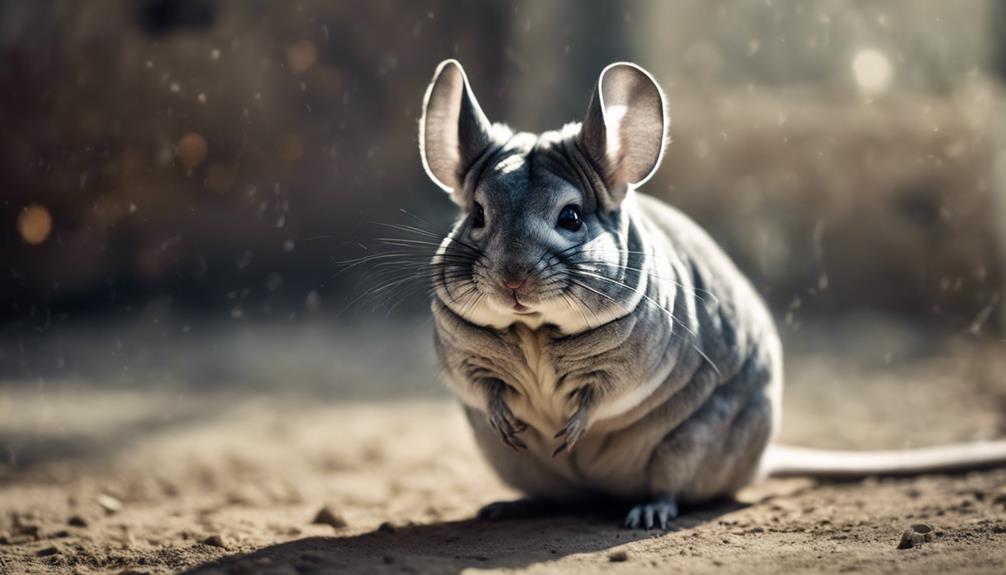
Various environmental factors can significantly impact the respiratory health of chinchillas. To ensure the well-being of these small mammals, it’s crucial to pay attention to the following factors:
- Air Quality: Chinchillas are sensitive to dust, pollen, and other airborne particles. Poor air quality can irritate their respiratory system, leading to potential health issues.
- Cage Ventilation: Proper airflow within the chinchilla’s cage is essential. Stagnant air can trap harmful particles and increase the risk of respiratory problems.
- Temperature and Humidity: Chinchillas thrive in cool, dry environments. High temperatures and excessive humidity can stress their respiratory system, making them more susceptible to illnesses.
- Cleanliness: A clean environment is vital for maintaining good respiratory health in chinchillas. Dust, mold, and ammonia from waste can all contribute to respiratory issues if not properly managed.
Frequently Asked Questions
Can Chinchillas With Respiratory Issues Be Treated at Home or Do They Always Require Veterinary Care?
When dealing with respiratory issues in chinchillas, it’s crucial to assess the severity of symptoms. While some home remedies may help mild cases, if symptoms worsen or persist, veterinary care is always recommended for proper diagnosis and treatment.
Are There Any Specific Breeds of Chinchillas That Are More Prone to Respiratory Problems?
When considering breeds, chinchillas like the Wilson White are known to have a higher susceptibility to respiratory problems. Genetics play a role in their predisposition to such issues, making it crucial to monitor their health closely.
Can Respiratory Issues in Chinchillas Be Prevented Through Diet and Exercise?
Like a strong breeze clearing the air, exercise and a balanced diet can help prevent respiratory issues in chinchillas. Regular activity benefits their lungs, while proper nutrition supports overall health, creating preventive habits for wellness.
How Do Environmental Factors Like Humidity and Temperature Affect a Chinchilla’s Respiratory Health?
Maintaining proper humidity regulation is essential for optimal respiratory health in chinchillas. Temperature control plays a vital role in ensuring the well-being of these small mammals. Monitoring these environmental factors can help prevent respiratory issues.
Are There Any Natural Remedies or Supplements That Can Help Improve Respiratory Health in Chinchillas?
Herbal remedies and respiratory supplements can aid in improving respiratory health in chinchillas. Natural remedies play a vital role in respiratory care, assisting in maintaining healthy airways and supporting overall lung function.










